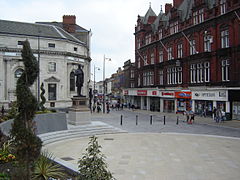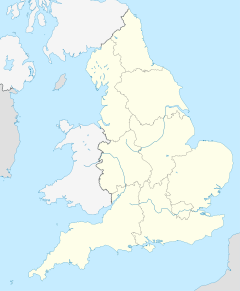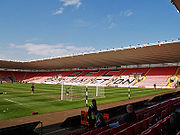Darlington
| Darlington | ||
|---|---|---|
| Downtown | ||
| Coordinates | 54 ° 31 ′ N , 1 ° 33 ′ W | |
| OS National Grid | NZ289147 | |
|
|
||
| Residents | 92,363 | |
| administration | ||
| Post town | DARLINGTON | |
| ZIP code section | DL1, DL2, DL3 | |
| prefix | 01325 | |
| Part of the country | England | |
| region | North East England | |
| Shire county | Durham | |
| District | Darlington | |
| British Parliament | Darlington | |
| Website: darlington.gov.uk | ||
Darlington is a medium-sized town in the District Darlington in County Durham in North East England . The city was previously an administrative part of Durham County , it now only belongs to Durham for ceremonial occasions. In 2011 Darlington had 92,363 and the Borough of Darlington 105,564 inhabitants.
Darlington is best known for the maiden voyage of the world's first passenger train, which ran on the Stockton and Darlington Railway from Shildon via Darlington to Stockton-on-Tees on September 27, 1825 .
geography
Darlington is located in the north of England , about 120 km from the Scottish border, in the Tees Valley . To the east of the city is the Teesside agglomeration , which Darlington does not belong to. The nearest major cities are Middlesbrough (25 km east), Newcastle (60 km north) and York (80 km south). At Darlington the river Skerne flows into the Tees , which in turn flows into the North Sea at Middlesbrough .
history
Darlington's existence began as a small Anglo-Saxon village. It was first mentioned in the early eleventh century as Dearthingtun .
In the Middle Ages Darlington belonged to the Bishop of Durham ; in the 12th century the bishop granted the town market rights. At that time Darlington only had several hundred inhabitants, most of whom lived from agriculture. However, there was also trade in woven and dyed wool and leather.
Darlington was a thriving little trading town for centuries as well. In 1585, however, the Darlington was destroyed by a large city fire; The extent of the damage was greatly enhanced by the construction made of wood and thatched roofs. The fire started on May 7, 1585 at 1 a.m. and spread rapidly. Since water was in short supply due to a drought, the residents tried desperately to put out the fire with beer and milk. 273 houses were destroyed, leaving 800 people homeless. However, the city was soon rebuilt.
Like other cities of the time, Darlington suffered tremendously from the effects of the plague ; 1543, 1597 and 1605 were years with the highest number of victims.
Darlington's first newspaper appeared in 1772. The first bank branch opened in 1774. In the 18th century, the construction of toll roads began. For example, a road was built from Boroughbridge via Darlington to Durham in 1745 , and another from Barnard Castle via Darlington to Stockton in 1749 . A third road from West Auckland to Darlington was completed in 1751.
In 1809 a pharmacy opened in Darlington, from which the poor population received free medicines. In 1864 a first hospital was finally opened in the city.
In 1823 street lighting with oil lamps and a night watch were introduced in the streets of the city. In 1830 the lighting was switched to gas lamps. Tap water was made available nationwide for the first time in 1846, and a modern sewage network was installed in 1850.
Darlington is always mentioned in close connection with the birth of the railway . The Darlington Railway Center and Museum , opened in 1975, commemorates that important event in 1825, when the world's first passenger train ran from Shildon via Darlington to Stockton-on-Tees.
In 1880, a horse-drawn railway network was built in Darlington, and Darlingtons station opened in 1887. In 1900 a power grid was installed in the city, which now has 50,000 inhabitants, so that in 1903 the horse-drawn trams could be replaced by electric trams. However, these were in turn replaced by buses in 1926.
The city became an important location for the production of railways with three large factories. The largest of these were the Darlington railway works , which operated from 1863 to 1966. The second plant was Robert Stephenson & Co. , whose owner moved from Newcastle in 1902, renamed Robert Stephensons & Hawthorns in 1937 , was bought by English Electric in 1960 and finally closed in 1964. The third plant was the Faverdale Wagon Works , founded in 1923 and closed in 1962 , which was the first company to start mass production of freight wagons.
In the late 20th century, Darlington's manufacturing operations became fewer and the service industry became more prevalent. The shopping center on Queen Street opened in 1969 and today's City Hall was built in 1970. The Cornmill Shopping Center opened in 1992.
In the summer of 2007, after a construction period of over two years, a project called The Pedestrian Heart was completed, in which large parts of Darlington's inner city were converted into a pedestrian zone. Initially, the project was criticized, among other things due to far-reaching changes in local public transport, but ultimately accepted.
In 2007 the decision was made to replace the outdated shopping center on Queen Street . A new building should be inaugurated in 2010, but was delayed as a result of the financial crisis from 2007 . As a result, the responsible company Discovery Properties tried again in 2010 for a building permit before the existing one expired. This was not granted until November 2011. However, the entrepreneur was still in talks with the city administration.
In August 2008, the King's Hotel in the city center was completely destroyed by fire ( picture ). Some adjacent shops were also severely damaged in some cases and had to be closed for weeks. There were no fatalities to mourn.
politics

Town twinning
Darlington is twinned with
-
 Amiens , France
Amiens , France
-
 Mülheim an der Ruhr , Germany (since 1953)
Mülheim an der Ruhr , Germany (since 1953)
Culture and sights
The Civic Theater is a well-known cultural center in the city, in which various theater, musical and pantomime performances take place.
The Rhythm'n'Brews Festival is an annual music and real ale festival in early fall with rock, blues and jazz performances at various locations across Darlington.
The Forum Music Center , which opened in 2004, offers regular live concerts in the music genres of ska, punk, indie and classic rock and also has several rehearsal rooms. The Carmel Rhythm Club is another music venue in the rhythm and blues genre .
Darlington offers a variety of shopping opportunities. Grange Road in particular has a number of expensive and attractive designer stores, and Duke Street is home to art galleries and restaurants.
Sports
The city's football club is Darlington FC , which currently plays in fourth-rate Football League Two and plays its home games in the Darlington Arena . The team is called The Quakers (the Quakers), which has to do with the support of the association by the Quakers Joseph and Edward Pease as well as the general great influence of this religious movement on the association. The city's rugby union club is Darlington Mowden Park RFC . The Dolphin Center is a sports and leisure center inaugurated by Roger Bannister in 1982 and reopened in 2006 after a £ 5 million refurbishment by athlete Tanni Gray-Thompson .
Economy and Infrastructure
The following table shows Darlington's regional gross value added (measured at current prices), published by the Office for National Statistics . The numbers are in millions of pounds sterling :
| year | Regional gross value added | Agriculture | Industry | Services |
|---|---|---|---|---|
| 1995 | 1,115 | 8th | 377 | 729 |
| 2000 | 1,192 | 6th | 417 | 768 |
| 2003 | 1,538 | 6th | 561 | 971 |
traffic
Originally the A1 ran directly north-south through Darlington. After a new route was opened west of the city, the old route had been renamed A167 ( Topcliffe - Newcastle). The £ 5.9 million motorway slip road A66 (M) opened on November 25, 1985, followed by the south-east bypass of the A66 ( Workington - Grangetown ) in 2008 .
The Darlington station is located on the East Coast Main Line and offers regular services to London ( King's Cross ), Leeds , Wakefield , Edinburgh , Manchester , Middlesbrough , to Manchester Airport and from Newcastle . North Road Station is outside of the city center.
The bus operation was guaranteed by Stagecoach until 2007 , after which Arriva North East took over its functions and operates the vast majority of bus routes in the city. Some lines have also been operated by Scarlet Band since 2009 . As one of six cities, Darlington received three million pounds from the Department for Transport to expand the city's cycle path network and connect it to national long-distance cycle routes.
About ten kilometers east of the city is Durham Tees Valley Airport , which offers many domestic flights as well as a smaller number of international destinations. Other airports in the area include Newcastle Airport (80 km away) and Leeds / Bradford Airport (100 km away). There is also a direct rail link to Manchester Airport (200 km away). The airport station Station Teesside Airport is the least used station in the UK.
media
The regional newspaper The Northern Echo and its side sheet Darlington & Stockton Times are printed in Darlington . The radio program Star Radio North East is broadcast from Darlington.
education
The Queen Elizabeth Sixth Form College is located in Darlington . Other schools are: Haughton Community School, Abbey Junior School, Branksome Science College, Hummersknott School, Carmel RC Technology College, Hurworth School, Haughton School which is now known as the Darlington Education Village, it also includes Beaumont Hill School and pringfield Primary and Longfield School . Private schools are the Raventhorpe Preparatory School, Hurworth House School and the Polam Hall School .
Personalities
sons and daughters of the town
- Edward Pease (1767–1858), Quaker and important entrepreneur
- Blair Cochrane (1853-1928), sailor
- William Edward Fothergill (1865–1926), surgeon and gynecologist, namesake of the Manchester Fothergill operation
- Katherine Routledge (1866–1935), b. Pease, historian known for her work on Easter Island.
- Edmund Backhouse (1873–1944), oriental scholar and linguist
- Ronald Brebner (1881-1914), football goalkeeper
- George Allison (1883–1957), football coach and official
- Willie Smith (1886–1982), snooker and English billiards player, two-time world champion
- Anthony Havelock-Allan (1905-2003), film producer
- Harry Catterick (1919–1985), football player and coach
- Al Pease (1921-2014), Canadian racing car driver
- Giuseppe Wilson (* 1945), football player
- Michael Lee (1969-2008), drummer
- Guy Wilks (* 1981), rally driver
- James Morrison (born 1986), football player
- Jann Mardenborough (* 1991), racing car driver
See also
Individual evidence
- ^ The Editors of Encyclopædia Britannica: Darlington ( English ) Encyclopædia Britannica. Retrieved May 1, 2017.
- ↑ A BRIEF HISTORY OF DARLINGTON
- ^ A new town center . In: Darlington Borough Council . Retrieved December 19, 2010.
- ↑ Town revamp 'may disrupt traders' , BBC News . September 16, 2005. Retrieved January 18, 2008.
- ↑ Trader hits out at the heart of the scheme, The Northern Echo. April 24, 2007. Retrieved January 18, 2008.
- ↑ Hearty thanks - Town center scheme is praised . In: Herald & Post . Retrieved December 19, 2010.
- ↑ itheadvertiserseries.co.uk: Shopping mall plan revived , 19 February 2010, access 24 December 2011
- ^ Paul Cook: Talks to resume over Commercial Street shopping complex in Darlington , November 30, 2011, accessed December 24, 2011
- ↑ www.staedtepartner-mh.de .
- ↑ Regional Gross Value Added ( English , PDF) Office for National Statistics. Archived from the original on March 3, 2005. Retrieved February 14, 2019.
- ↑ rounded values, minor deviations in the total possible
- ↑ including hunting and forestry
- ↑ including energy and production
- ↑ £ 3 m to make town a more friendly place for cyclists, The Northern Echo. October 21, 2005. Retrieved February 1, 2008.
- ↑ Alpha 103.2 - Public Information File . Alpha 103.2 official website. Archived from the original on May 11, 2008. Retrieved March 11, 2008.
Web links
- Darlington Borough Council (English)
- Visit Darlington







